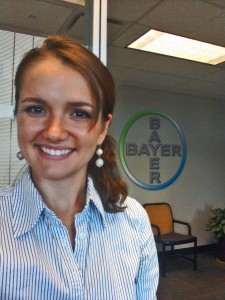My day
I work in Corporate Communications at Bayer Corporation in Pittsburgh, Pa. It still amazes me every day how such a small department does so much work for such a large company. I work in an open office space with four other people and my boss has an office a few feet away. The lack of cubicles encourages us to talk and share ideas often, and I love hearing what everyone else is working on.
First thing in the morning, I read my emails and check for mentions of Bayer in the U.S. media. I run the media archive for the department, keeping a record of all the mentions of Bayer in outlets such as newspapers, television, and radio shows. I use this data to compile quarterly media reports so we can measure how much coverage we receive and whether it’s positive or negative.
Most of my work revolves around social media. I write campaigns for our Twitter and Facebook pages, post videos to YouTube, and I recently started working on campaigns for Pinterest. That’s probably my favorite thing about this internship – Bayer encourages interns to come up with their own ideas and then they help make them a reality. I pitched a plan for adding content on our Pinterest page, my boss thought it was a great idea, and then I actually got to implement it.
Working with social media has been an eye-opening experience for me. I thought there would be a lot of original content generation, but it turns out that a lot of social media is just drawing attention to content that already exists. The goal of our tweets and Facebook posts is to drive traffic back to our company’s websites.
My job isn’t only social media, though. I also write pieces for our employee intranet and press releases for our external websites. I get to interview people within the company, attend events and take photos, and then write articles about those experiences.
I also work with content management systems to update our websites. Technology is a big part of communications these days, so it’s important to feel comfortable with learning new software and understanding how websites work
Grad school
I absolutely loved studying English literature at Penn, but I knew I wanted to pursue a career outside of academia after I graduated. I took a wide variety of classes, including graphic design, health care management, and psychology, so I wanted to find a graduate program blended some of my interests. I found the MAPW program at Carnegie Mellon University. It teaches on writing and graphic design to prepare students for a career in communications, technical writing, software documentation, or any other writing-focused field.
In order to get into grad school, recommendations from professors were very important. I took multiple classes taught by the same professors in order to develop a strong relationship with them. When you ask for a letter of recommendation, you should ask someone who’s familiar with your work and also your personality. It’s very helpful if you attend your professor’s office hours or ask for extra feedback on assignments.
I’ve now completed one year of my master’s degree, and I can tell you that the Penn name carries a lot of weight both in academia and in the professional world. At Bayer and at Carnegie Mellon, my professors and colleagues consistently say that Penn is a great school and I received a great education by going there. If you ever feel discouraged or overwhelmed, just remember that all your hard work at Penn really will pay off after you graduate.
My advice
If you’re interested in a position but you’re worried you’re not qualified for it, apply anyway. I was worried that with my background as an English major, no one in the healthcare communications field would want me. That hasn’t been the case. I’ve done communications in two hospitals and I now work for a huge pharmaceutical company. Employers are interested in your ability to learn and adapt, so don’t be scared away from applying for a job if you think your experience isn’t related.
The other big thing I would recommend is be proactive about your job search. If there’s a company that you would love to work for but they don’t have positions listed, contact them anyway! I have had really good luck with this tactic. Find the name of a person in the department where you want to work and send them an email asking if they have anything available. People have been very responsive to me when I’ve reached out like that. It shows you have initiative and that you have a strong interest in the company.
I did a lot of mentoring while I was at Penn, and I still love to help out students who are wondering about majors, grad school, and jobs. If you have questions or just want to talk about life after Penn, you can email me at tayler@alumni.upenn.edu.


